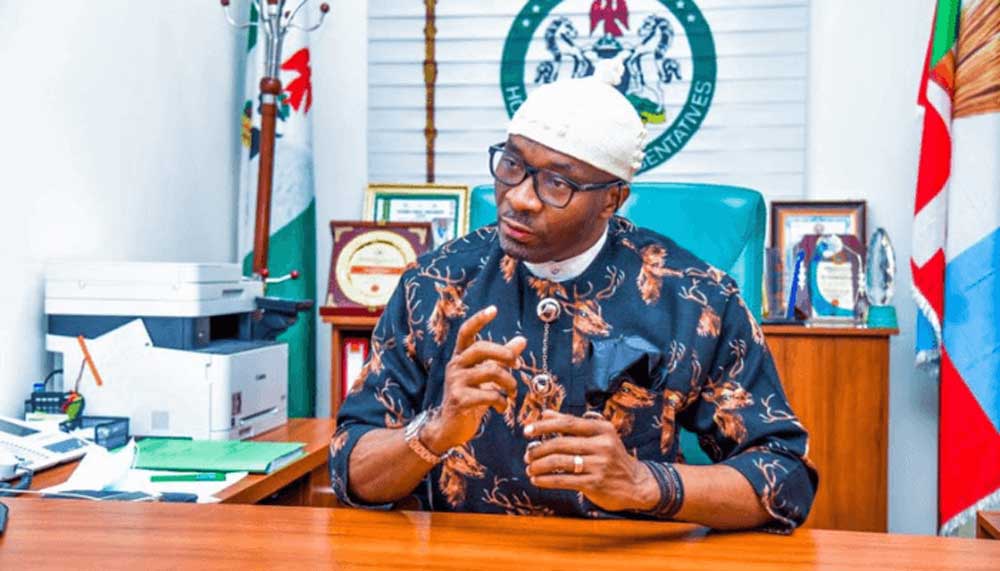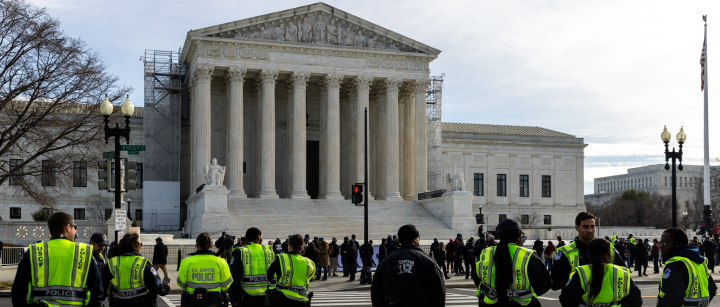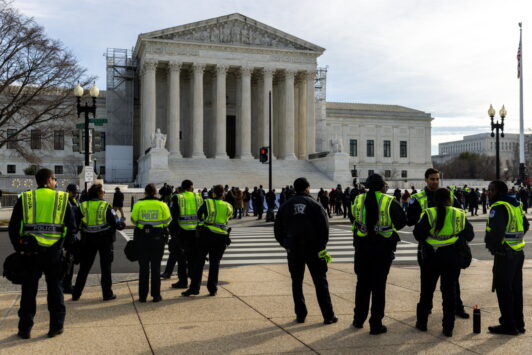
By Julia Buckley, CNN
(CNN) — Ed Pierson was flying from Seattle to New Jersey in 2023, when he ended up boarding a plane he’d never wanted to fly on.
The Seattle resident booked with Alaska Airlines last March, purposefully selecting a flight with a plane he was happy to board – essentially, anything but a Boeing 737 Max.
“I got to the airport, checked again that it wasn’t the Max. I went through security, got coffee. I walked onto the plane – I thought, it’s kinda new,” Pierson told CNN. “Then I sat down and on the emergency card [in the seat pocket] it said it was a Max.”
He got up and walked off.
“A flight attendant was closing the front door. I said, ‘I wasn’t supposed to fly the Max.’ She was like, ‘What do you know about the Max?,’” he said.
“I said, ‘I can’t go into detail right now, but I wasn’t planning on flying the Max, and I want to get off the plane.’”
Pierson made it to New Jersey – after some back and forth, he said, Alaska’s airport staff rebooked him onto a red-eye that evening on a different plane. Spending the whole day in the airport was worth it to avoid flying on the Max, he said.
Pierson has a unique and first-hand perspective of the aircraft, made by Boeing at its Renton factory in the state of Washington. Now the executive director of airline watchdog group Foundation for Aviation Safety, he served as a squadron commanding officer among other leadership roles during a 30-year Naval career, followed by 10 years at Boeing – including three as a senior manager in production support at Renton itself, working on the 737 Max project before its launch.
But he’s one of a number of travelers who do not want to board the aircraft which has been at the heart of two fatal crashes, as well as the January 5 incident in which part of the fuselage of an Alaska Airlines plane blew out mid-air. The part – a door plug – was found to be missing four bolts that should have held it in place. Further reports of “many” loose bolts and misdrilled holes have emerged from the subsequent investigations into the Max 9 model after the Federal Aviation Administration (FAA) ordered the grounding of 171 Max 9 aircraft with the same door plug.
Experts agree that the Alaska incident could have been worse, and the chair of the National Transportation Safety Board (NTSB) has warned that “something like this can happen again.”
The previous model, the Max 8, was involved in two fatal crashes in 2018 and 2019 that killed a total of 346 people. The crashes were widely attributed to the malfunctioning of MCAS, an automated system in the Max designed to stabilize the pitch of the plane, overriding pilot input in some circumstances. Boeing accepted its liability in 2021 for one of the crashes.
Weeks after the Alaska incident, Boeing CEO David Calhoun told investors on a quarterly call: “We will cooperate fully and transparently with the FAA at every turn… This increased scrutiny, whether it comes from us or a regulator or from third parties will make us better.”
“We caused the problem, and we understand that,” Calhoun said. “Whatever conclusions are reached, Boeing is accountable for what happened. Whatever the specific cause of the accident might turn out to be, an event like this simply must not happen on an airplane that leaves one of our factories. We simply must be better.”
In February, in the wake of the Alaska incident, the company removed the head of the Max program from his position and reshuffled other senior management figures.
The move comes as critics have repeatedly said that the aircraft manufacturer is prioritizing profits over safety.
The FAA is now “taking a holistic look at the quality control issues at Boeing to ensure safety is always the company’s top priority,” a spokesperson for the government agency told CNN. Representatives are on the ground assessing the production lines at Boeing’s Renton factory and Spirit AeroSystems, whose Wichita, Kansas factory made the door plug that blew off mid-flight in the Alaska incident.
On February 28, the FAA gave Boeing 90 days to come up with a plan to address quality and safety issues.
Boeing told CNN: “Every day, more than 80 airlines operate about 5,000 flights with the global fleet of 1,300 737 MAX airplanes, carrying 700,000 passengers to their destinations safely. The 737 MAX family’s in-service reliability is above 99% and consistent with other commercial airplane models.”
Of course, many thousands of people board Max aircraft with no concerns. But do other passengers care? It appears that enough do.
Mixed impressions
The last time the Max was grounded – for 20 months, following the crash of Ethiopian Airlines flight 302 on a Max 8 in March 2019 – 25% of the 1,005 Americans questioned in a Reuters/Ipsos poll said that they had “not a lot” or “no” confidence in the aircraft – compared to 31% who did, and 44% who were unsure. The poll was taken in December 2020, shortly before the aircraft’s return to the skies.
After being “told about the aircraft’s safety issues,” a further 57% said they would be somewhat unlikely or not likely to fly in a Max, according to the report. Nearly half – 45% – said that they would still be somewhat unlikely or not very likely to fly in it after it had been back in the air for six months. And 31% of all respondents said that they had little to no confidence that the Federation Aviation Administration (FAA) “puts passenger and crew safety first when determining whether an aircraft is fit to fly.”
Most countries cleared the Max 8 to fly again by 2021, but three years on, there still appears to be negative public opinion about the Max.
“It’s unsettling that there have been so many issues with this specific type of plane,” Stephanie King, a passenger on the affected Alaska Airlines flight, told CNN in January. “I hope something is done so that this doesn’t happen again.”
Then there’s flight booking site Kayak, which has seen usage of its filter to deselect Max aircraft (models 8 and 9) during the booking process increase 15-fold since January, the company told CNN. The site introduced the filter in March 2019, after the Ethiopian Airlines crash.
Doubts have also remained across the industry as a whole. Following the Alaska incident, a February AP-Norc poll regarding air travel safety found nearly a third of Americans surveyed answered “not at all” or “a little” when asked if they believe that airplanes are safe from structural faults. While planes were generally viewed to be as safe as cars or trains for means of transportation, fewer than two in 10 surveyed strongly agreed that planes are fault-free.
If it’s Boeing, ‘I ain’t going’
Belén Estacio has boycotted the Max since the January incident. Shortly after the Alaska Airlines fuselage blowout, she was scheduled on a Max for a work flight.
“My boyfriend didn’t want me to fly on it so I changed my travel plans to make sure I wasn’t flying on any type of Max,” she said.
“It doesn’t matter which model, I don’t want to fly them.” To her, she said, “The Alaska incident was further confirmation that Boeing is still not being thorough and not fixing its issues.”
Florida-based Estacio, who works in marketing, now checks the aircraft type before booking any flight. She’s made two trips since January.
“The whole thing of, ‘If it’s not Boeing I ain’t going,’ it’s totally the opposite now,” she said. “I’m very happy when I’ve seen I’ll be flying an Airbus.”
She says she’s not the only one in her circle, and says she knows people employing both “soft” and “hard” boycotts.
“Some say, ‘Absolutely not,’ others say, ‘If I can change it, I will; if not I’ll just go on it.’”
‘Not an aircraft I’d want to fly’
UK-based communications consultant Elayne Grimes is another with a personal boycott. Grimes, who travels regularly for work, was worried following the Max 8’s first crash in October 2018: Lion Air flight 610, in Indonesia, which killed all 189 onboard a plane in service for less than three months. Grimes – who’d previously worked in emergency crisis management – was immediately concerned about Boeing’s new aircraft, which had launched to great fanfare in 2017.
“I actively sought out airlines that didn’t have the Max,” she said. When Ethiopian Airlines flight 302 crashed in March 2019, killing another 157 people, it confirmed her resolve.
In 2022, Grimes watched “Downfall: The Case Against Boeing,” a Netflix documentary directed by Rory Kennedy, which looked at the two tragedies and flagged concerns about the working environment at Boeing.
“I watched that and thought [Boeing] was an organization putting profit before people, and thought, ‘That’s not for me.’ I don’t see myself flying one in the near future,” she said.
While the FAA has cleared the Max to fly once more, Grimes believes that “its issues are not resolved.”
“When the door came off and they called [the planes] in and found other aircraft with issues, I thought ‘Hmm,’” she said. “It’s just not an aircraft I’d want to fly.”
Grimes is a self-declared “avgeek,” or aviation fanatic – and she’s not the only one monitoring the industry closely to have reservations. Elliot Sharod, who says he took 78 flights last year, is on the fence. “I wouldn’t exactly refuse to fly it, but I’d ideally fly an Airbus if given the choice,” he said.
A former aviation journalist, who wished to remain anonymous for professional reasons, says they lost trust after the second crash.
“After the first one, the predominant talking points were, ‘Oh, it’s got to be pilot error, or the weather – it can’t be the plane,” they say. “It was Boeing. I believed that everything coming out of Boeing had been tested and retested – it had to be something else.
“Then the Ethiopian crash happened, and there was a bit of the same messaging, but finally it came out that actually it was the plane. I lost all trust at that point in the Max.”
They say they still love flying the “older style of Boeings – the 777s and the original 737s.”
“They were all designed back in the days when engineers ruled Boeing,” they say. “I feel I can trust them more than the Max.”
‘Piss poor design’
“Would you put your family on a Max simulator trained aircraft? I wouldn’t.”
They sound like the words of an anxious passenger in 2024. In fact, they were written by one Boeing employee to another in February 2018 – eight months before the Lion Air crash. (In the internal communications, their co-worker replied, simply, “No.”)
In April 2017, in internal messages by Boeing employees working on the soon-to-be-released Max, another employee wrote, “This airplane is designed by clowns, who in turn are supervised by monkeys.” The same exchange included a reference to the aircraft’s “piss poor design.” A design tweak was labelled as “patching the leaky boat.”
These internal communications were released as part of the 18-month investigation into the Max by the House Committee on Transportation and Infrastructure. In a 238-page report, released in September 2020, the committee outlined “the serious flaws and missteps in the design, development, and certification of the aircraft.” The report highlighted five key themes, including “production pressures that jeopardized the safety of the flying public” and a “culture of concealment” at Boeing.
At the time, Boeing said that the communications “do not reflect the company we are and need to be, and they are completely unacceptable.” The company issued a statement acknowledging the committee’s findings and saying that the victims of the crashes were “in our thoughts and prayers.”
Boeing said that when the Max 8 returned to service it would be “one of the most thoroughly scrutinized aircraft in history, and we have full confidence in its safety.”
It added: “We have been hard at work strengthening our safety culture and rebuilding trust with our customers, regulators, and the flying public… We have made fundamental changes to our company… and continue to look for ways to improve.”
The House Committee report also included concerns about the FAA and its “grossly insufficient oversight” over Boeing during the Max design process and in the period between the two crashes. The report said that “gaps in the regulatory system at the FAA… allowed this fatally flawed plane into service.”
A spokesperson for the FAA told CNN: “The FAA made significant improvements to its delegation and aircraft certification processes in recent years and took immediate action following the Jan. 5 Alaska Airlines door plug incident to address concerns about the quality of aircraft that Boeing and its suppliers produce.”
‘Vindicated’ after safety failure
Rory Kennedy followed the investigation from start to finish. The director of “Downfall” told CNN she didn’t have a “strong opinion” on the plane until she started making the documentary in early 2020.
But, she said, “I was shocked by what we discovered… [it] was really disturbing.”
Her film is a forensic investigation of the two crashes. “Downfall” interviews ex-Boeing staff and concerned pilots, who paint a picture of an accident waiting to happen. It follows the congressional hearings held as part of the House investigation, and interviews the victims’ families.
Kennedy says that during the design process Boeing “went to great pains to hide [MCAS] and how powerful it was.” The stabilizing system was designed specifically for the Max, since the fuel-efficient engines being added to the 1960s-designed plane affected the trim. The House committee found that Boeing concealed its existence from the FAA, airlines and pilots.
Additionally, after the Lion Air crash, FAA analysis in December 2018 predicted that without a software fix, a Max could crash on average once every two years over the course of its usage. Yet the plane was not grounded at the time.
“Boeing and FAA both gambled with public safety,” House committee chair Peter DeFazio said in a 2020 statement.
“We are already undertaking important initiatives based on what we have learned… these initiatives are focused on advancing overall aviation safety by improving our organization, process and culture,” the FAA said in a statement following the committee’s report.
“[They] decided to keep the plane in the air, to save money and try to have a fix before the next plane crashed,” said Kennedy. “I interviewed [family members of the victims] as they were understanding that they knew this. Can you imagine?”
“I would absolutely not fly that plane,” she told CNN. “I’ve not noticed the culture of Boeing has shifted from one that prioritizes finances over safety.”
She says that one of the factors that pushed her to make the documentary, was “talking to pilots who were telling me, ‘Absolutely don’t get on that plane.’”
And while she initially received pushback about the film, including from family and friends, “When the door ripped off the airplane, people said, ‘You’re so vindicated.’”
Her research also highlighted production issues in the 787 Dreamliner – Boeing’s flagship long-haul aircraft, which debuted in 2011. As a result, she avoids that, too – and suggests that instead of confining their investigations to individual planes, the FAA and NTSB should be investigating Boeing as a whole.
A spokesperson for the FAA said that it has blocked production expansion of the Max, and “is conducting enhanced oversight of Boeing and its suppliers. The agency is examining all aspects of Boeing’s three manufacturing lines and Spirit AeroSystems’ supplier activities. A dedicated team of approximately two dozen aviation safety inspectors is conducting these reviews at the Boeing 737 MAX facility in Renton, Washington, and at Spirit AeroSystems in Wichita, Kansas.”
Kennedy wants a “proper hearing” in Congress – similar to the one that investigated the Max crashes.
“To me, what you really need is an investigation into the culture of Boeing, what’s happening at board level, and what kind of decisions are being made to continue to prioritize financial interests over the safety of consumers,” she says.
‘Their numbers game cost me my friend’
Critics say that Boeing’s 1997 merger with McDonnell Douglas saw the culture change from one that emphasized engineering prowess to one intent on watching the bottom line.
Damning its “broken safety culture,” DeFazio said after the 2020 investigation that “Boeing – under pressure to compete with Airbus and deliver profits for Wall Street – escaped scrutiny from the FAA, withheld critical information from pilots, and ultimately put planes into service that killed 346 innocent people.”
In 2021, Boeing agreed to pay $2.5 billion to settle criminal charges that the company defrauded the FAA when the Max was first certified.
“The reason that [Boeing’s] culture is so damaging is because they are in a numbers game, and they want to make as much profit as possible at any cost. And for me, that cost me my friend,” says Deveney Williams.
In March 2019, Williams’ friend, Samya Stumo, was onboard the Ethiopian Airlines flight. The pair had been due to move into an apartment together in Washington, D.C.
“I avoid Boeing as much as possible – I try to get on an Airbus even if it costs more or is a different route,” said Williams.
“I never knew about plane models prior to this, but I’ve educated myself onto how to see the model when buying a ticket. I’ve got friends who ask how they can switch flights, or figure out how to avoid flying on this. I’ve learned a lot – I don’t want this happening to anyone else.”
For Williams, the Alaska incident was a “weird relief” – because it happened in the US. The aspersions that were cast on the pilots of the two crashes didn’t happen in January. “This time, it’s on American soil, I’m presuming it was an American pilot – so they don’t have any other fingers to point.”
‘Airlines don’t make it easy to switch’
Torleif Stumo – Samya’s brother – had a similar incident to Ed Pierson, in which he says his plane was switched to a Max at the last moment. Like Pierson, he only noticed when he saw the safety card in the seat pocket of his flight from Panama City to Bogotá in August 2023.
“I don’t really have anxiety, I’ve never had panic attacks but that was one of the closest times I ever came,” he says.
“The crew were amazing. They had disconnected from the jetway and initially offered to change my seat to first class. But then I told them why I wanted to get off. They immediately understood and brought the plane back [to the gate].”
Stumo ended up spending the night at an airport hotel. The airline he was traveling with agreed to rebook him fee-free having listened to a phone call he’d made to customer services when originally buying the ticket. In it, he’d been assured that he wouldn’t be on a Max.
Williams and Kennedy both say they’ve had similar experiences with their aircraft switched to a Max at the last minute.
Stumo believes that it’s not easy enough for consumers to tell whether they’ve been booked onto a Max. Michael Stumo, Samya and Torleif’s father, wants aircraft types to be “prominently displayed” during the booking process, he tells CNN.
Following the January 5 incident, Alaska and United – the US carriers which use the Max 9 – issued waivers allowing passengers unwilling to fly the Max flexibility. These have now expired, but Alaska told CNN that concerned passengers can be rebooked onto a different aircraft for free, by calling reservations.
“We have complete confidence in the safety of all our aircraft,” they added.
A spokesperson for United said the airline “has no change fees on most tickets. We’re happy to work with customers with concerns to find a solution that works for them.”
Pierson’s Foundation for Aviation Safety – established in 2023 as a watchdog for both the aviation industry and the government entities that regulate it – added a page to their website in February for passengers reluctant to fly on the plane. It explains how to check the plane assigned for one’s flight before booking, refusing to board, and rebooking at the airport.
Pierson says the foundation gets many requests from the public asking whether it’s safe to fly the Max.
The former Boeing employee has been critical of Boeing company since the aircraft was first on the production line. Over the summer of 2018, he sent several messages up the chain at Boeing, having noticed what he now says was an “unstable production line.” In emails which he has since shared publicly, Pierson warned of his concerns that the intense pressure to get planes out of the factory was leading exhausted workers to cut corners. He feared that it could end in tragedy, he wrote.
Having taken early retirement in August 2018 – “I knew it was an unhealthy working environment and couldn’t support the leadership anymore,” he told CNN – he wrote again to the board of Boeing, as well as to the FAA, after the Lion Air crash, and then again after the Ethiopian Airlines crash. He later testified at the congressional hearing.
“I would definitely not fly that plane,” he says now. “The same problems that I saw in 2017 and 2018 have not been resolved. The factory is still putting huge amounts of pressure on employees that build the planes, and they’ve had many production quality defects that just came to light.”
‘We want no third crash’
Although the Max is flying once more, its future appears to be up in the air. The FAA has capped production of new aircraft, and launched an investigation “into whether Boeing failed to maintain their quality system in accordance with federal regulations.” It has also launched an analysis of “potential safety-focused reforms around quality control,” a spokesperson told CNN.
As part of its “enhanced oversight,” FAA teams are reviewing Boeing’s Max production system, and Spirit AeroSystems’ production system for the aircraft’s fuselage. It is also reviewing employee training and qualifications, increasing its onsite presence at Max manufacturing facilities, and looking at “how Boeing transfers unfinished work from suppliers to its production lines,” a spokesperson told CNN.
Meanwhile, the NTSB’s investigation into what happened on Alaska Airlines flight 1282 continues.
A preliminary NTSB report does not lay blame on Boeing nor find a probable cause, which is typically included in the NTSB’s final report which could take a year or more.
Spirit said following the incident it was cooperating with the NTSB and added, “as a company, we remain focused on the quality of each aircraft structure that leaves our facilities.”
For Michael Stumo, the Alaska incident proved his fears. “We have nine years of [Boeing] getting caught, promising to do better, and they don’t,” he said. “Now we have this: where they can’t even put plug doors in a plane, can’t fix bolts.”
Stumo wants Boeing to “bring in people who know how to do complex manufacturing processes.”
“These people exist. Boeing has a lot of money. Hire them,” he said.
A Boeing spokesperson said the company has “invested heavily in our workforce over the last several years.” Engineering staff are up by 10% and manufacturing by 11%, they said, while they have “increased the number of Commercial Airplanes quality inspectors by 20%, and have said we will continue to hire.”
“We have also invested in quality across the company, growing the number of quality employees by more than 25%, exceeding 2019 pre-pandemic levels,” they added.
Stumo says the company needs urgent change.
“The first crash shouldn’t have happened. The second they had full knowledge of [the MCAS malfunctioning] – it absolutely shouldn’t have happened.
“We want no third crash. And we want Boeing transformed back into the superior aviation engineering company making amazing and safe products that it was.”
The-CNN-Wire
& © 2024 Cable News Network, Inc., a Warner Bros. Discovery Company. All rights reserved.










